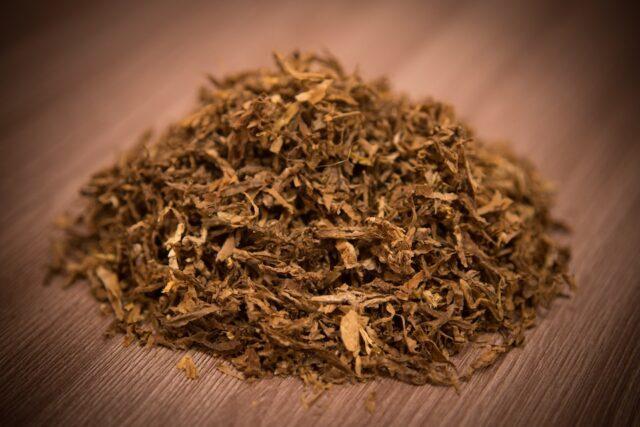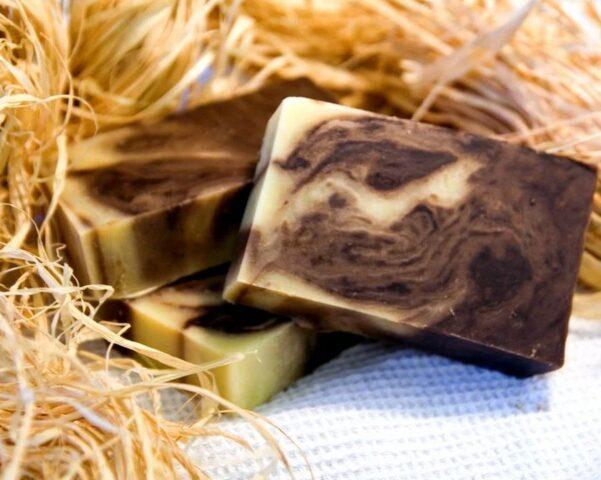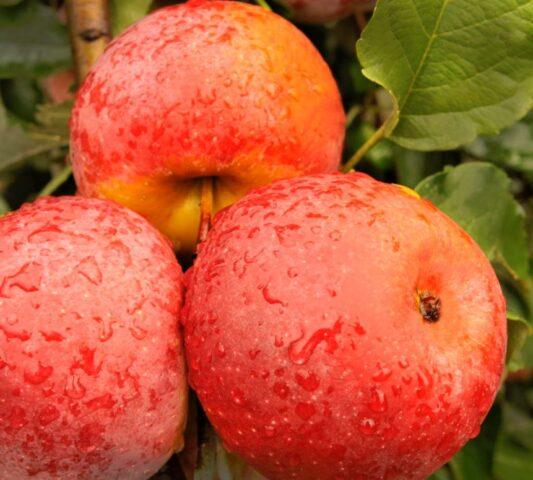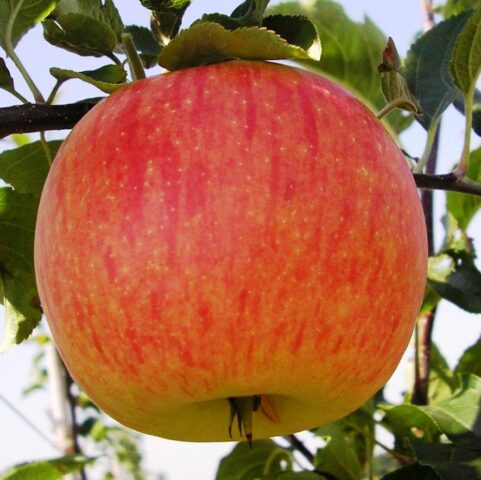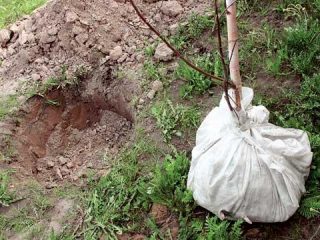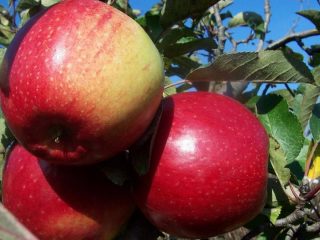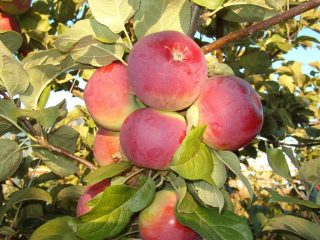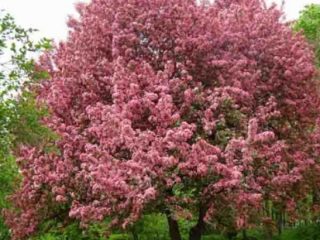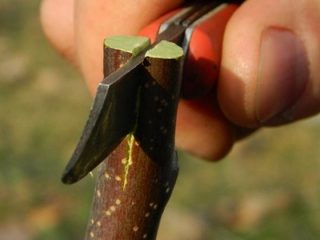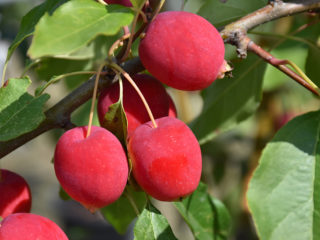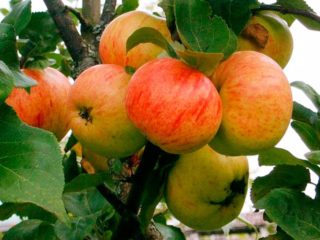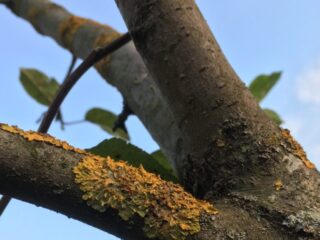Content
Aphids on apple trees can cause great damage to the crop. To cope with an insect, you need to study its main signs and causes of its appearance, as well as become familiar with effective insecticides.
What does aphid look like on an apple tree?
Aphids are small insects with an oblong or round body up to 0.8 mm in length. The pest's shell is soft and translucent, with small tubercles and outgrowths, and light fluff. In color, aphids can be brown, yellow or green; the latter variety is most often found on apple trees. The insect's head is trapezoidal, with antennae at the top and black or reddish eyes. The mouthparts are represented by a proboscis, with which the pest pierces plant tissue and sucks out the juices from them.
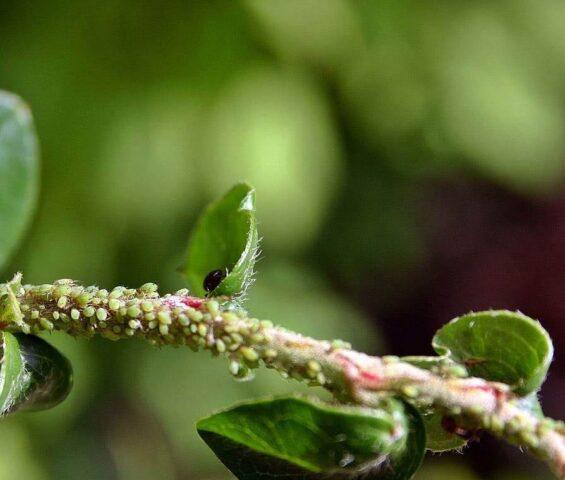
The maximum number of aphids on an apple tree can be seen around mid-July
In autumn, apple aphids lay eggs in the soil, and in spring, during the formation of buds, larvae emerge from them within a week.Hatched insects feed on the buds of the tree's leaves, then move on to the blossoming blades and buds. By the beginning of the flowering of the crop, an adult aphid is formed, which also lays larvae.
What harm does
Despite their microscopic size, aphids are a very dangerous garden pest. In particular, the insect:
- leads to a slowdown in tree development;
- negatively affects the quality of fruits;
- slows down the formation of ovaries;
- makes trees vulnerable to fungal infections and other pests;
- reduces the general immunity of plants.
Under the influence of aphids, the leaves of the apple tree become covered with a dense sticky coating and become deformed, and then dry out and fall off.
Signs of defeat
It is difficult to notice the presence of aphids on an apple tree in the early stages, since the pest first attacks the upper shoots of the plant. After the parasite multiplies, the symptoms become more obvious. The presence of insects is reported:
- deformed sheet plates covered with a glossy sticky coating;
- unopened buds;
- young shoots twisted at the top;
- swelling and reddish spots on the plates.
If you carefully examine the damaged apple tree, you can see a huge number of small insects clinging to the leaves on the back side. The presence of the pest is also indirectly reported by ants on tree shoots.
Measures to combat aphids on apple trees
There are several ways to remove aphids from an apple tree. There are both folk and chemical remedies with a good degree of effectiveness.
Biological products
Biological agents against aphids have the mildest possible effect on the apple tree itself and do not harm it even during the period of fruit ripening. Popular formulations include:
- Fitoverm. The drug is supplied in ampoules or bottles of 10-50 ml; it must be diluted according to the instructions. Typically, for spraying fruit trees, 4-6 ml of the product is dissolved in 1 liter of water.
Spraying the apple tree with Fitoverm against aphids is carried out once every two weeks twice a season
- Aktofit. For spring treatment of apple trees against aphids, a biological preparation in the form of a transparent yellowish liquid with a sharp, specific odor is suitable. It is necessary to mix 6 ml of the product in 1 liter of water and spray in dry and windless weather.
Spraying with Actofit is carried out at temperatures above 18 ° C
Biological preparations against aphids on apple trees should be used for weak or moderate infestation of the plant. If the pest has multiplied very profusely, it is better to immediately resort to aggressive chemicals.
Chemicals against aphids on apple trees
You can quickly and reliably destroy aphids on an apple tree using chemicals. Such drugs have an aggressive composition and demonstrate a good effect against most pests:
- Spark Golden. A chemical product with the active ingredient imidacloprid works well against aphids and the Colorado potato beetle, is not washed off by rain and remains effective in heat and drought. To prepare the working solution, you need to mix only 1 ml of the drug in 5 liters of water and spray it over the crowns of trees for 100 m2 plot.
Iskra Zolotaya is safe for humans and animals
- Cypermethrin. A synthetic product from the group of pyrethroids helps save apple trees from aphids.As a rule, for spraying, dissolve about 2 ml of the composition in 1 liter of water and spray. In total, treatments are performed three times per season.
The protective effect of Cypermethrin is about two weeks.
- Actellik. One of the most effective chemicals reliably eliminates most garden pests. To eliminate aphids on apple trees, you need to dilute 2 ml of the product in 1 liter of liquid and spray 10 m2 plot. After 10-15 days, the treatment is repeated again for prevention.
The disadvantage of Actellik is the toxicity of the drug to humans and animals.
The advantages of chemical preparations include their rapid action and almost guaranteed results. But during the flowering period and shortly before harvesting, treatments cannot be performed. The last spraying is carried out no later than three weeks before harvesting ripened apples.
Mechanical methods
Mechanical methods mainly help protect the apple tree from aphids, but when there are a large number of pests, they are ineffective. To protect trees it is recommended:
- Use catch belts. At a distance of about 50 cm from the ground, the apple tree should be wrapped with masking tape and a special pest-repellent glue should be applied to it. The trap should be renewed from time to time as the sticky layer will dry out or run down due to the heat.
- Plant plants with a strong smell, such as onions, garlic, parsley, basil or mint. Aphids do not tolerate strong aromas and rarely attack areas of the garden with the listed crops.
If there are few pests on the leaves, you can wash them off with a stream of warm water with moderate pressure.However, it will not be possible to reliably protect the apple tree from aphids in this way - the parasites will soon return.
How to get rid of aphids on an apple tree using folk remedies
Spraying an apple tree against aphids can be done using mild homemade preparations. Folk remedies help well with the first symptoms of infection, when there are still few pests on the leaves:
- Ammonia. You can treat an apple tree against aphids without chemicals with a simple solution of ammonia. It is necessary to dilute a small bottle of ammonia in 15 liters of water and spray the trees 2-3 times with weekly breaks.
When treating an apple tree with ammonia, it is necessary to strictly observe the proportions so as not to cause burns to the plant.
- Tobacco. You can treat a flowering apple tree against aphids using the following method: grind about 200 g of tobacco leaves, add 10 liters of water and boil for a couple of hours. After this, the broth is cooled and filtered from sediment, and then sprayed at intervals of 1-2 weeks until the parasites are eliminated.
Tobacco can be used to fumigate apple trees against pests for several hours.
- Soap. To prepare the insecticidal agent, about 10 g of shavings are stirred in a bucket of warm water until completely homogeneous. The drug does not kill parasites, but repels them and prevents them from feeding on leaves.
To prepare a solution against aphids, it is recommended to use laundry or tar soap
You need to use home remedies for spraying fruit trees in cloudy weather or in the morning and evening. In bright sunshine, treatment is not carried out, as the preparations can leave burns on the leaves.
When can you spray apple trees against aphids?
It is necessary to combat green aphids on apple trees throughout the year, since the pest begins to be active in early spring and has a negative impact on the crop until autumn. The first treatment is performed during the period of kidney formation, usually using home remedies or mild biological preparations.
At the beginning of summer, at the stage of fruit set, another 2-3 sprayings are carried out. In case of serious damage, aphids on the apple tree can be treated, including with aggressive chemicals. But a month before harvest, spraying is stopped so that the fruits do not accumulate toxic substances.
The final processing of the crop is carried out in the fall in preparation for winter. Strong chemical or biological preparations are used to eliminate pests hiding under the bark of the apple tree or in the top layer of soil.
How to treat an apple tree against aphids during flowering
If aphids appear on apple flowers, special care must be taken when processing. Do not use chemicals, as they can harm beneficial insects and disrupt pollination processes.
Fruit trees are treated with biological preparations and folk compounds. It is recommended to start spraying at the first sign of the pest, before the aphids cause serious damage to the apple tree.
How to treat apple trees against aphids after flowering
It is recommended to treat apple trees against aphids after flowering using biological agents. They are quite effective and do not cause harm to developing ovaries.
If there are a lot of aphids on the leaves, it is allowed to use chemicals. But they can only be used in the early stages of fruit formation.Insecticides against aphids on an apple tree, when sprayed shortly before harvest, can cause damage to the latter and make it unfit for consumption.
Apple tree varieties resistant to aphids
Photos of aphids on an apple tree confirm that any trees can be damaged by the insect. But some varieties with good immunity to infections and pests get sick less often:
- Florina. The apple tree practically does not suffer from aphids and demonstrates high resistance to scab, powdery mildew and moniliosis. It bears small fruits weighing up to 170 g with yellowish skin and scarlet blush.
Florina apples do not have a dessert taste, but are rated at a good 4.1 points
- Jonathan. The American variety is resistant to fungal diseases and pests, has a pleasant sweetish-sour taste and sweet aroma. Apples ripen by mid-September and are well suited for transportation.
Jonathan apples can withstand long-term storage and can last until mid-spring
- Melba. The variety bears small juicy fruits weighing an average of 150 g with a sour-sweet taste. The color of the apples is yellowish-pink, with red stripes, the skin is smooth and thin.
The Melba variety is rarely affected by aphids and fungi, and is also highly frost-resistant
When growing hardy varieties, it is still necessary to follow the rules of aphid prevention and regularly inspect the leaves of the trees. With poor quality care, any apple tree can suffer from garden pests.
Protecting the apple tree from aphids
You can fight aphids on a young apple tree in a variety of ways. But priority attention should be paid to preventing the appearance of the pest:
- inspect the leaves, shoots and bark of trees weekly in order to notice parasites in time;
- plant fragrant herbs in the garden next to apple trees that repel aphids and attract beneficial insects;
- every autumn, clear the area of plant debris and rotting fruits to deprive the pest of the chance of overwintering in a warm place;
- before the onset of cold weather, dig up the soil shallowly under the roots of trees;
- control the intensity of watering and fertilizing in the garden.
For prevention, it is useful to spray apple trees with folk remedies from time to time, even in the absence of pests.
Conclusion
Aphids appear on apple trees early, multiply very quickly and cause severe damage to fruit trees. If the number of insects is small, it is recommended to use gentle folk and biological remedies for treatment. If the apple trees are severely affected, it is worth resorting to chemicals that can quickly eliminate the parasites.






